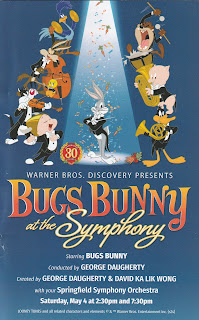A recent outing to my local symphony hall brought together two loves…classical music and classic cartoons. Many of you have attended theatrical releases of classic films—particularly silent movies—with accompaniment by full orchestra, but this was my first experience with cartoons and a full orchestra, a traveling presentation that you may have seen in your area at some point in the last several years—Bugs Bunny at the Symphony.
My cartoon expert twin brother, John, and I head for the Springfield (Mass.) Symphony Hall to catch a matinee performance and really enjoyed it. The technology of the melding of the full (and always excellent) Springfield Symphony Orchestra and the cartoons was fascinating, and the guest conductor, (and co-creator of the show) George Daugherty, was a delight. He explained some technical aspects and the history of Hollywood orchestration, particularly the superior full orchestra at Warner Bros. at the time, and he was quite charmingly funny. At one point on the screen in Baton Bunny (1968) when Bugs, standing at the podium as a conductor lifts his arms in an exaggerated manner in preparation to signal his orchestra, Mr. Daugherty did the same and mimicked him.
The program began with Rossini’s majestic Overture to Il Barbiere Di Siviglia with no cartoon accompaniment. It was thrilling…and something else I didn’t expect. It was funny. Several of us in the audience began to chuckle in a way I’m sure Rossini, despite the opera’s being a comedy, didn’t intend, because those of us who were familiar with the Bugs Bunny cartoon The Rabbit of Seville (1950), were imagining the progress of the cartoon in our minds, especially the part where bugs splashes hair tonic and rubs it into the scalp of the unfortunate Elmer Fudd. Later on in the program, Daugherty pointed this out and said this audience reaction to the overture was a common occurrence for that reason. He ran into it many times. We knew the cartoon from the music, and we knew the music from the cartoon--or at least, many people's introduction to classical music was through cartoons of that period.
He also gave credit to the woefully uncredited Arthur Q. Bryan, voice of Elmer Fudd (and so many old-time radio characters), which warmed my heart. He pointed out several fascinating facts about orchestration and lauded the Warner Bros. music department. (And some jaw-dropping stats on Wagner's music in What's Opera Doc? - 1957) If this traveling show visits your local symphony, it’s well worth catching a performance.
There were children in the audience, as to be expected, but not as many as I thought there would be. Some were dressed down, even in pajamas—the publicity wing suggested wearing pajamas and even suppled cereal and milk before the show to emulate the old Saturday morning cartoons experience.
Other kids were dressed in their best, as befitting the symphony, and that was nice to see. The conductor took a quick hands-up poll and revealed that most people in the audience had never been to the symphony before, and he expressed the hope that this would be a fun introduction for them and that they would return. I hope so, too. Especially the kids.
One of the most wondrous revelations for them, and maybe
even some of their parents, was to see that music on a screen, whether in a
cartoon or a movie, doesn’t just happen.
A lot of people playing a lot of different instruments, mostly at the
same time, is what makes the music, and in cartoons, much of the special sound
effects come from the orchestra as well.
Maybe some of those kids might take up music after seeing all those
people on stage playing all those instruments right in front of them. How many eyes, I wonder, drifted down from
the big screen to the violinists, to the percussion section (especially after
so many failures of Acme products for Wile E. Coyote)?
*******************
Our greatest gift from the Greatest Generation was freedom from fascism. Relive, and celebrate, how evil was faced, discussed, dramatized...and fought. Classic films were Hollywood's weapon.
Get your copy of my book Hollywood Fights Fascism here at Amazon in print or eBook, or FREE here for a limited time at Barnes & Noble, Apple, Kobo, and a variety of other online shops.
Jacqueline T. Lynch is the author of Ann Blyth: Actress. Singer. Star. and Movies in Our Time - Hollywood Mirrors and Mimics the Twentieth Century and Hollywood Fights Fascism and Christmas in Classic Films. TO JOIN HER READERS' GROUP - follow this link for a free book as a thank-you for joining.



No comments:
Post a Comment